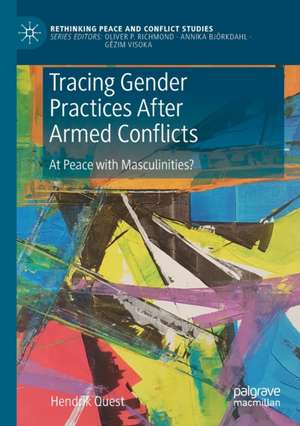Tracing Gender Practices After Armed Conflicts: At Peace with Masculinities?: Rethinking Peace and Conflict Studies
Autor Hendrik Questen Limba Engleză Paperback – 22 iul 2023
| Toate formatele și edițiile | Preț | Express |
|---|---|---|
| Paperback (1) | 886.26 lei 43-57 zile | |
| Springer International Publishing – 22 iul 2023 | 886.26 lei 43-57 zile | |
| Hardback (1) | 891.48 lei 43-57 zile | |
| Springer International Publishing – 22 iul 2022 | 891.48 lei 43-57 zile |
Din seria Rethinking Peace and Conflict Studies
-
 Preț: 357.93 lei
Preț: 357.93 lei -
 Preț: 113.00 lei
Preț: 113.00 lei - 15%
 Preț: 646.62 lei
Preț: 646.62 lei -
 Preț: 318.69 lei
Preț: 318.69 lei - 20%
 Preț: 565.31 lei
Preț: 565.31 lei -
 Preț: 272.92 lei
Preț: 272.92 lei -
 Preț: 387.20 lei
Preț: 387.20 lei - 15%
 Preț: 574.77 lei
Preț: 574.77 lei - 15%
 Preț: 699.45 lei
Preț: 699.45 lei -
 Preț: 390.63 lei
Preț: 390.63 lei - 15%
 Preț: 639.25 lei
Preț: 639.25 lei -
 Preț: 390.63 lei
Preț: 390.63 lei - 15%
 Preț: 644.30 lei
Preț: 644.30 lei -
 Preț: 390.63 lei
Preț: 390.63 lei - 15%
 Preț: 644.95 lei
Preț: 644.95 lei -
 Preț: 392.21 lei
Preț: 392.21 lei -
 Preț: 384.86 lei
Preț: 384.86 lei -
 Preț: 387.58 lei
Preț: 387.58 lei -
 Preț: 386.99 lei
Preț: 386.99 lei -
 Preț: 385.84 lei
Preț: 385.84 lei -
 Preț: 388.72 lei
Preț: 388.72 lei -
 Preț: 390.63 lei
Preț: 390.63 lei -
 Preț: 389.49 lei
Preț: 389.49 lei -
 Preț: 391.61 lei
Preț: 391.61 lei -
 Preț: 390.63 lei
Preț: 390.63 lei -
 Preț: 391.61 lei
Preț: 391.61 lei -
 Preț: 389.88 lei
Preț: 389.88 lei -
 Preț: 386.39 lei
Preț: 386.39 lei -
 Preț: 426.56 lei
Preț: 426.56 lei -
 Preț: 389.88 lei
Preț: 389.88 lei -
 Preț: 389.88 lei
Preț: 389.88 lei -
 Preț: 417.14 lei
Preț: 417.14 lei - 15%
 Preț: 699.93 lei
Preț: 699.93 lei -
 Preț: 392.60 lei
Preț: 392.60 lei -
 Preț: 389.11 lei
Preț: 389.11 lei - 18%
 Preț: 783.25 lei
Preț: 783.25 lei -
 Preț: 392.60 lei
Preț: 392.60 lei -
 Preț: 388.72 lei
Preț: 388.72 lei -
 Preț: 388.72 lei
Preț: 388.72 lei -
 Preț: 388.52 lei
Preț: 388.52 lei
Preț: 886.26 lei
Preț vechi: 1080.81 lei
-18% Nou
Puncte Express: 1329
Preț estimativ în valută:
169.58€ • 177.54$ • 140.32£
169.58€ • 177.54$ • 140.32£
Carte tipărită la comandă
Livrare economică 07-21 aprilie
Preluare comenzi: 021 569.72.76
Specificații
ISBN-13: 9783031085437
ISBN-10: 3031085434
Ilustrații: XIX, 235 p. 5 illus., 4 illus. in color.
Dimensiuni: 148 x 210 mm
Greutate: 0.31 kg
Ediția:1st ed. 2022
Editura: Springer International Publishing
Colecția Palgrave Macmillan
Seria Rethinking Peace and Conflict Studies
Locul publicării:Cham, Switzerland
ISBN-10: 3031085434
Ilustrații: XIX, 235 p. 5 illus., 4 illus. in color.
Dimensiuni: 148 x 210 mm
Greutate: 0.31 kg
Ediția:1st ed. 2022
Editura: Springer International Publishing
Colecția Palgrave Macmillan
Seria Rethinking Peace and Conflict Studies
Locul publicării:Cham, Switzerland
Cuprins
1. Introduction: The Change Post-Conflict Masculinities.- 2. The Antagonism between Men and Women.- 3. The Antagonism between Perpetrators and Victims.- 4. The Antagonism between Fighters and Civilians.- 5. A Theory of Violence-Centred Masculinities and their Transformation.- 6. At Peace with Masculinities?.
Notă biografică
Hendrik Quest is Research Associate and Lecturer at the Institute of Political Science, University of Tübingen, Germany.
Textul de pe ultima copertă
This book offers a unique perspective on changing gender practices in post-conflict societies, looking at when and how masculinities change after armed conflicts. Building on original research data from Liberia, chapters look at the pathways of change in societal discourses, security sector institutions, and at the level of formatter combatants. Scrutinising the potential of peacebuilding for making conflict-related masculinities change after armed conflicts, the book develops a theoretical model that helps to understand both how violence-centred masculinities change after armed conflicts, and why profound changes of violent gender practices occur only rarely. What this book hopes to show is that masculinities can and do change after armed conflicts. Illuminating the intricate interrelationship between gendered practices within societal discourses, security sector institutions, and at the individual level in post-conflict societies, this book constitutes an invitation to rethinking ourunderstanding of peacebuilding practices and their interconnectedness with gender, violence, and peace.
Hendrik Quest is Research Associate and Lecturer at the Institute of Political Science, University of Tübingen, Germany.
Caracteristici
Offers a comprehensive model of violence-centered masculinities and their change Based on original interview data including members of the Armed Forces of Liberia, and the Liberia National Police Provides a practice-theoretical understanding of gender
